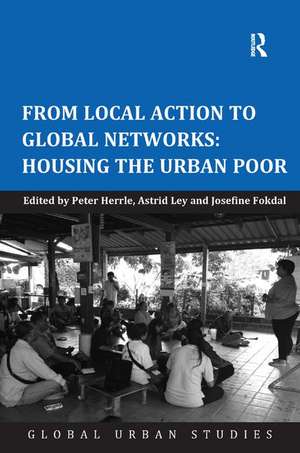From Local Action to Global Networks: Housing the Urban Poor: Global Urban Studies
Autor Peter Herrle, Astrid Leyen Limba Engleză Hardback – 28 sep 2015
Preț: 766.31 lei
Preț vechi: 1028.64 lei
-26% Nou
Puncte Express: 1149
Preț estimativ în valută:
146.65€ • 150.18$ • 121.99£
146.65€ • 150.18$ • 121.99£
Carte tipărită la comandă
Livrare economică 19 martie-02 aprilie
Preluare comenzi: 021 569.72.76
Specificații
ISBN-13: 9781472450517
ISBN-10: 1472450515
Pagini: 220
Dimensiuni: 156 x 234 x 19 mm
Greutate: 0.57 kg
Ediția:1
Editura: Taylor & Francis
Colecția Routledge
Seria Global Urban Studies
Locul publicării:Oxford, United Kingdom
ISBN-10: 1472450515
Pagini: 220
Dimensiuni: 156 x 234 x 19 mm
Greutate: 0.57 kg
Ediția:1
Editura: Taylor & Francis
Colecția Routledge
Seria Global Urban Studies
Locul publicării:Oxford, United Kingdom
Public țintă
Postgraduate and UndergraduateCuprins
Contents: Introduction: housing processes taking roots in local action and extending to global networks, Peter Herrle, Astrid Ley and Josefine Fokdal. Part I Qualities of Networks by Urban Poor: Urban poor housing development in Asia: from target group to negotiating partner, Somsook Boonyabancha and Thomas Kerr; How urban poor networks are re-scaling the housing process in Thailand, the Philippines and South Africa, Astrid Ley, Josefine Fokdal and Peter Herrle; Transnational networks of urban poor federations and their modes of action and cooperation - lessons from Tanzania, Beate Ginzel. Part II Positioning of Urban Poor Networks: Moving from consultation to empowerment? The role of slum dweller organizations in global policy networks, Interview with Gunter Meinert and Rene Peter Hohmann; From grassroots shacks to the towers of power: relationship building of transnational urban poor networks. Experiences from Africa and Asia, Josefine Fokdal, Astrid Ley and Peter Herrle; Quiet conflict: institutional change, informal settlement upgrading, and formalized partnerships between local authorities and urban social movements in South Africa, Benjamin H. Bradlow; Transforming the housing process in the Philippines: the role of local-global networks by the urban poor, Anna Marie Karaos and Emma Porio. Part III Urban Poor Networks in Global Development Policy: Urban grassroots movements and agencies of development cooperation, Klaus Teschner; Making sure the 'voices of the poor' are heard: why forms of transnational activism can make a difference, Diana Mitlin; Grappling with housing issues at the city scale: mobilizing the right to the city in South Africa, Liza Cirolia, Warren Smit and James Duminy; Collective strength by global networks of the urban poor: policy implications of affordable housing and co-development strategies, Matt Nohn; Transnational networks of urban poor: key for a more collaborative urban governance?, Peter Herrle, Josefine Fokdal and Astrid Ley. Index.
Notă biografică
Dr Peter Herrle is Professor for International Urbanism at the Technische Universität Berlin, Germany and until 2012 was Director of the Habitat Unit at Faculty VI at the same institution, Dr Astrid Ley is Professor for International Urbanism and Director of the Institute for Urban Planning and Design at the University of Stuttgart, Germany, and Dr Josefine Fokdal is lecturer and researcher for International Urbanism at Technische Universität Berlin, Germany.
Recenzii
"Its contributions challenge readers, scholars and policy-makers alike to rethink traditional conceptions of policy communities and advocacy by fleshing out key motives for transnational cooperation between urban poor organizations. The authors offer an invaluable theoretical contribution to the emerging field of transnational housing activism."
Timothée Labelle, Centre Mechtilde, Gatineau, Quebec, Canada, Housing Studies.
’This book opens a new chapter in the tale of economic globalization: the transnational organization of the urban poor. Globalization has restructured our cities, increasing both wealth and inequality. What started in Asia and Africa as community-based organizations, often led by women, have become powerful national and transnational players. An extraordinary book on an extraordinary phenomenon!’ Harald A. Mieg. Humboldt-Universität zu Berlin, Germany ’This innovative book explores a new social space in the fields of housing and urban studies of which little is known: transnational links from below. Based on ample evidence of interlinked, scaled-up and multi-scalar housing initiatives of the urban poor in Africa and Asia it scans strategic options to move beyond informality and marginalization through collaborative urban governance.’ Volker Kreibich, TU Dortmund University, Germany
Timothée Labelle, Centre Mechtilde, Gatineau, Quebec, Canada, Housing Studies.
’This book opens a new chapter in the tale of economic globalization: the transnational organization of the urban poor. Globalization has restructured our cities, increasing both wealth and inequality. What started in Asia and Africa as community-based organizations, often led by women, have become powerful national and transnational players. An extraordinary book on an extraordinary phenomenon!’ Harald A. Mieg. Humboldt-Universität zu Berlin, Germany ’This innovative book explores a new social space in the fields of housing and urban studies of which little is known: transnational links from below. Based on ample evidence of interlinked, scaled-up and multi-scalar housing initiatives of the urban poor in Africa and Asia it scans strategic options to move beyond informality and marginalization through collaborative urban governance.’ Volker Kreibich, TU Dortmund University, Germany
Descriere
Over the past two decades it has become widely recognized that housing issues have to be placed in a broader framework acknowledging that civil society in the form of Community Based Organizations (CBOs) and their allies are increasingly networking and emerging as strong players that cannot easily be overlooked.This book brings together different perspectives on multi-scalar approaches within the housing field and on grassroots’ engagement with formal agencies including local government, higher levels of government and international agencies. By moving away from romanticizing local self-initiatives, it focuses on understanding the emerging potential once local initiatives are interlinked and scaled-up to transnational networks.











